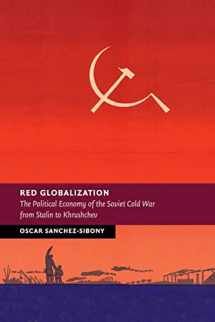
Red Globalization: The Political Economy of the Soviet Cold War from Stalin to Khrushchev (New Studies in European History)
ISBN-13:
9781316635292
ISBN-10:
1316635295
Edition:
Reprint
Author:
Oscar Sanchez-Sibony
Publication date:
2016
Publisher:
Cambridge University Press
Format:
Paperback
294 pages
Category:
Economic Conditions
,
Economics
FREE US shipping
Book details
ISBN-13:
9781316635292
ISBN-10:
1316635295
Edition:
Reprint
Author:
Oscar Sanchez-Sibony
Publication date:
2016
Publisher:
Cambridge University Press
Format:
Paperback
294 pages
Category:
Economic Conditions
,
Economics
Summary
Red Globalization: The Political Economy of the Soviet Cold War from Stalin to Khrushchev (New Studies in European History) (ISBN-13: 9781316635292 and ISBN-10: 1316635295), written by authors
Oscar Sanchez-Sibony, was published by Cambridge University Press in 2016.
With an overall rating of 3.5 stars, it's a notable title among other
Economic Conditions
(Economics) books. You can easily purchase or rent Red Globalization: The Political Economy of the Soviet Cold War from Stalin to Khrushchev (New Studies in European History) (Paperback) from BooksRun,
along with many other new and used
Economic Conditions
books
and textbooks.
And, if you're looking to sell your copy, our current buyback offer is $1.
Description
Winner, 2015 Marshall D. Shulman Book Prize, Association for Slavic, East European, and Eurasian Studies
Was the Soviet Union a superpower? Red Globalization is a significant rereading of the Cold War as an economic struggle shaped by the global economy. Oscar Sanchez-Sibony challenges the idea that the Soviet Union represented a parallel socio-economic construct to the liberal world economy. Instead he shows that the USSR, a middle-income country more often than not at the mercy of global economic forces, tracked the same path as other countries in the world, moving from 1930s autarky to the globalizing processes of the postwar period. In examining the constraints and opportunities afforded the Soviets in their engagement of the capitalist world, he questions the very foundations of the Cold War narrative as a contest between superpowers in a bipolar world. Far from an economic force in the world, the Soviets managed only to become dependent providers of energy to the rich world, and second-best partners to the global South.
Was the Soviet Union a superpower? Red Globalization is a significant rereading of the Cold War as an economic struggle shaped by the global economy. Oscar Sanchez-Sibony challenges the idea that the Soviet Union represented a parallel socio-economic construct to the liberal world economy. Instead he shows that the USSR, a middle-income country more often than not at the mercy of global economic forces, tracked the same path as other countries in the world, moving from 1930s autarky to the globalizing processes of the postwar period. In examining the constraints and opportunities afforded the Soviets in their engagement of the capitalist world, he questions the very foundations of the Cold War narrative as a contest between superpowers in a bipolar world. Far from an economic force in the world, the Soviets managed only to become dependent providers of energy to the rich world, and second-best partners to the global South.


We would LOVE it if you could help us and other readers by reviewing the book
Book review

Congratulations! We have received your book review.
{user}
{createdAt}
by {truncated_author}


